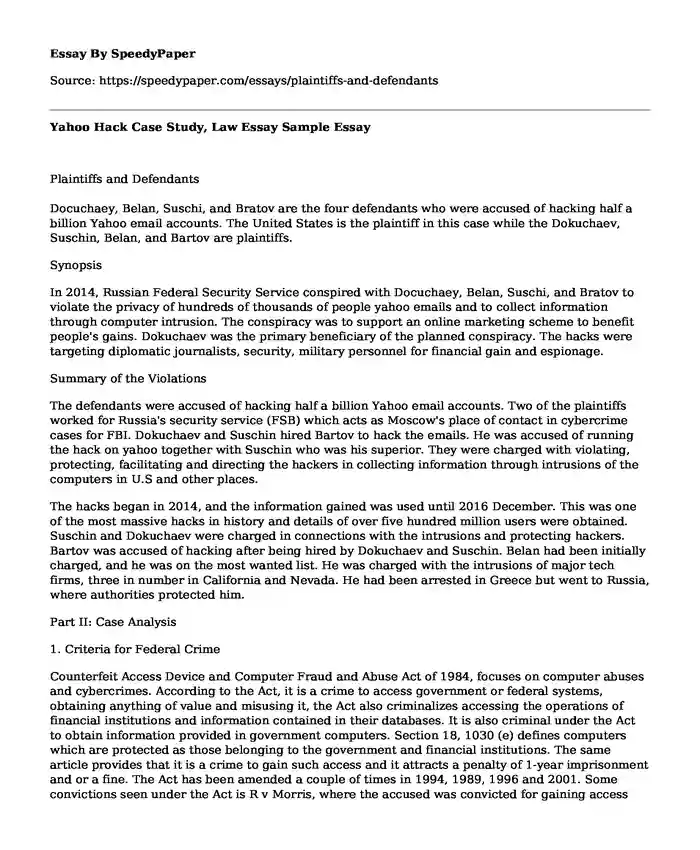
| Type of paper: | Essay |
| Categories: | Law Yahoo Cyber security |
| Pages: | 3 |
| Wordcount: | 723 words |
Plaintiffs and Defendants
Docuchaey, Belan, Suschi, and Bratov are the four defendants who were accused of hacking half a billion Yahoo email accounts. The United States is the plaintiff in this case while the Dokuchaev, Suschin, Belan, and Bartov are plaintiffs.
Synopsis
In 2014, Russian Federal Security Service conspired with Docuchaey, Belan, Suschi, and Bratov to violate the privacy of hundreds of thousands of people yahoo emails and to collect information through computer intrusion. The conspiracy was to support an online marketing scheme to benefit people's gains. Dokuchaev was the primary beneficiary of the planned conspiracy. The hacks were targeting diplomatic journalists, security, military personnel for financial gain and espionage.
Summary of the Violations
The defendants were accused of hacking half a billion Yahoo email accounts. Two of the plaintiffs worked for Russia's security service (FSB) which acts as Moscow's place of contact in cybercrime cases for FBI. Dokuchaev and Suschin hired Bartov to hack the emails. He was accused of running the hack on yahoo together with Suschin who was his superior. They were charged with violating, protecting, facilitating and directing the hackers in collecting information through intrusions of the computers in U.S and other places.
The hacks began in 2014, and the information gained was used until 2016 December. This was one of the most massive hacks in history and details of over five hundred million users were obtained. Suschin and Dokuchaev were charged in connections with the intrusions and protecting hackers. Bartov was accused of hacking after being hired by Dokuchaev and Suschin. Belan had been initially charged, and he was on the most wanted list. He was charged with the intrusions of major tech firms, three in number in California and Nevada. He had been arrested in Greece but went to Russia, where authorities protected him.
Part II: Case Analysis
1. Criteria for Federal Crime
Counterfeit Access Device and Computer Fraud and Abuse Act of 1984, focuses on computer abuses and cybercrimes. According to the Act, it is a crime to access government or federal systems, obtaining anything of value and misusing it, the Act also criminalizes accessing the operations of financial institutions and information contained in their databases. It is also criminal under the Act to obtain information provided in government computers. Section 18, 1030 (e) defines computers which are protected as those belonging to the government and financial institutions. The same article provides that it is a crime to gain such access and it attracts a penalty of 1-year imprisonment and or a fine. The Act has been amended a couple of times in 1994, 1989, 1996 and 2001. Some convictions seen under the Act is R v Morris, where the accused was convicted for gaining access and causing damages to computers of federal interest.
2. Criminal Intent
Based on the alleged facts, all the accused had the criminal intent which makes them culpable under the Counterfeit Access Device and Computer Fraud and Abuse Act of 1984. They all wanted to gain access to the emails so that they can use the information for personal gain. Belan had initially been accused, and he is caught for the same crime more than once, hence showing intent. The hacking also happened in 2014, after the accused persons lost access, they continued to use the information they acquired until 2016, and this shows intent. Dokuchaeva and Suschin had criminal intent because; despite knowing that Balan was wanted they continued to protect him. They also had intention because they puppeteer the hackers to do what they wanted. They financed the pirates, directed them and even defended them. Bartov was mainly hired to hack the emails, so when he agreed to do that, he already had the criminal intent to hack emails. Bartov also owned several online shops where he was selling email hacking services for as much as $60 for a password. All these deliberate steps taken to make money out of hacking shows prohibited criminal intent.
Conclusion
To sum up, the accused were all culpable for the crimes prohibited under the Fraud and Abuse Act. They all even had the intent and made hefty profits from the information they obtained. Therefore, they are culpable due to the criminal intent, hence should be convicted of the same.
Works cited
Counterfeit Access Device and Computer Fraud and Abuse Act of 1984
Sky News "US charges two Russian spies and two 'criminal hackers' over Yahoo hack." Sky News 15 Mar 2017.
Cite this page
Yahoo Hack Case Study, Law Essay Sample. (2022, Feb 18). Retrieved from https://speedypaper.com/essays/plaintiffs-and-defendants
Request Removal
If you are the original author of this essay and no longer wish to have it published on the SpeedyPaper website, please click below to request its removal:
- Definition of Man Flu Essay Example
- Essay Example on Munchausen Syndrome by Proxy Cases
- Essay Example on How to Reduce Stress for Students
- Free Essay Sample on Software, Movies and Music Privacy
- Free Essay on Public Health: The Anthem Policy
- Essay Sample on the Blackface Show
- Quality and Environmental Management - Free Essay Example
Popular categories




